
ALSIC-Apprentissage des Langues et Systems d Information et de Communication
Scope & Guideline
Innovating Language Acquisition in the Digital Age.
Introduction
Aims and Scopes
- Intercultural Language Learning and Teaching:
The journal emphasizes the importance of intercultural exchange in language education, particularly through virtual platforms that facilitate communication and collaboration among learners from diverse backgrounds. - Digital Pedagogy and Technology Integration:
A core focus of ALSIC is on the integration of digital technologies into language learning, examining how tools like virtual reality, online resources, and telecollaboration can enhance educational outcomes. - Teacher Education and Professional Development:
The journal addresses the training and professional practices of language educators, particularly in adapting to digital environments and fostering new teaching methodologies. - Digital Citizenship and Literacy:
ALSIC explores the concepts of digital citizenship and literacy, aiming to equip language learners with the skills necessary to navigate and communicate effectively in digital spaces. - Multimodal and Interactive Learning Environments:
The journal investigates the use of multimodal resources and interactive platforms in language teaching, focusing on how these approaches can support diverse learning styles and enhance engagement.
Trending and Emerging
- Telecollaboration and Virtual Exchange:
Recent publications indicate a growing interest in telecollaboration as a means to enhance language learning through real-time interaction and cultural exchange, which is crucial for developing global competencies. - Digital Tools for Language Teaching:
There is an increasing focus on the development and application of digital tools, such as apps and online platforms, that facilitate language learning and teaching, making education more accessible and engaging. - Research on Digital Citizenship:
The theme of digital citizenship is gaining traction, with studies exploring how language education can integrate concepts of responsible online behavior and cross-cultural communication. - Impact of Multimedia on Learning Processes:
Emerging research is highlighting the effects of multimedia and technology on learners' attentional processes and overall engagement, indicating a shift towards understanding cognitive aspects of digital learning. - Innovative Teacher Training Programs:
The journal is increasingly focusing on innovative teacher training programs that equip educators with the skills necessary to effectively integrate technology into their teaching practices.
Declining or Waning
- Traditional Classroom Practices:
There has been a noticeable decline in research centered around conventional classroom practices, as the journal increasingly prioritizes innovative, technology-driven pedagogies. - Basic Linguistic Competence without Digital Context:
Research focusing solely on foundational linguistic competencies, without the integration of digital contexts or tools, appears to be waning as educators seek more relevant, modern approaches. - Static Language Resources:
The exploration of static resources, such as textbooks and non-interactive materials, is becoming less prominent, as the journal emphasizes dynamic and interactive digital resources instead. - Monolingual Approaches to Language Learning:
As the journal promotes multilingualism and digital citizenship, there is a decline in the focus on monolingual methods, reflecting a shift towards more inclusive and diverse language learning practices. - Assessment Methods Based on Traditional Exams:
There is a diminishing emphasis on traditional assessment methods, as the journal increasingly supports alternative forms of evaluation that align with digital learning environments.
Similar Journals
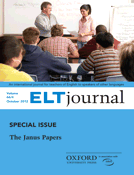
ELT Journal
Fostering Excellence in Educational Psychology and LinguisticsELT Journal, published by Oxford University Press, is a premier academic journal dedicated to the fields of Educational Psychology, Linguistics, and Language, boasting an esteemed Q1 category ranking across these disciplines. Since its inception in 1946, the journal has served as a vital platform for researchers and educators, offering insights into English Language Teaching (ELT) and the evolving pedagogical practices that influence language acquisition and literacy development. With an impressive Scopus ranking placing it in the 95th percentile within the Arts and Humanities (Linguistics and Language), ELT Journal not only contributes to academic discourse but also bridges theoretical frameworks with practical applications in educational settings. Although it does not currently offer Open Access, the journal remains essential for professionals and students alike, eager to stay abreast of the latest research trends and innovations in the global ELT landscape. For those committed to advancing their understanding of language education, the journal's diverse range of articles and case studies provide invaluable resources.
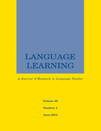
LANGUAGE LEARNING
Elevating discourse in linguistics and education.LANGUAGE LEARNING is a premier academic journal dedicated to advancing the field of language acquisition and education, published by Wiley. With a foundation dating back to 1948, the journal has carved an esteemed niche in the academic landscape, currently holding a prestigious Q1 rank in both the categories of Education and Linguistics and Language. It proudly occupies the 9th percentile rank in the Arts and Humanities domain and the 10th percentile in Social Sciences, illustrating its influence and reach. The journal publishes high-quality research that explores various dimensions of language learning, from cognitive processes to pedagogical approaches, making it an essential resource for researchers, educators, and students alike. Although Access options are non-open, the journal remains accessible to a wide audience, reinforcing its commitment to disseminating critical insights within the academic community.

Studies in Self-Access Learning Journal
Transforming education through research and collaboration.Studies in Self-Access Learning Journal is a pioneering academic outlet dedicated to the exploration and advancement of self-access learning practices across diverse educational contexts. Published by Kanda University of International Studies in Japan, this open access journal has been committed to disseminating high-quality research since its inception in 2010, facilitating global access to valuable insights in the fields of Computer Science Applications, Education, and Linguistics and Language. With a significant presence in academic databases, the journal has achieved notable rankings, including Q3 in both Computer Science Applications and Education, and Q2 in Linguistics and Language for 2023. Its emphasis on innovative practices in self-directed learning makes it an essential resource for researchers, educators, and practitioners alike, who are looking to contribute to and benefit from the latest findings in this dynamic area of study. As the journal continues to evolve through its converged years from 2019 to 2024, it remains a vital forum for scholarly dialogue, encouraging multidisciplinary collaborations and enriching the educational landscape.
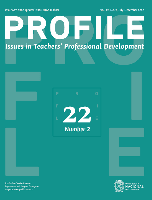
Profile-Issues in Teachers Professional Development
Empowering Teachers: Navigating the Future of Professional DevelopmentProfile - Issues in Teachers Professional Development is a distinguished open access journal published by the Universidad Nacional de Colombia, Facultad Ciencias Humanas, aimed at fostering research and discourse surrounding critical issues in educators' ongoing professional development. Since its inception in 2005, the journal has established itself as a significant resource within the fields of Education and Linguistics and Language, reflecting its relevance through its category quartiles, being positioned in Q3 in Education and an impressive Q1 in Linguistics and Language for 2023. The journal boasts a commendable Scopus ranking, reflecting its impact and commitment to advancing scholarly discussion, with rankings of #236 out of 1167 in Linguistics and Language, and #818 out of 1543 in Education. With a converged timeline from 2018 to 2024, it serves as a vital platform for educators, researchers, and students alike, encouraging the dissemination of innovative practices and insights essential for the evolution of teacher training and professional growth in a rapidly changing educational landscape.

Foro de Profesores de E-LE
Connecting Scholars, Enhancing Language EducationForo de Profesores de E-LE is a premier open-access journal dedicated to the dissemination of scholarly knowledge in the field of electronic language education. Published by Universidad de Valencia, this journal has been servicing the academic community since 2005, offering a platform for researchers, educators, and practitioners to share their insights and advancements. With a focus on innovative teaching methodologies, digital resources, and the integration of technology in language instruction, Foro de Profesores de E-LE plays a critical role in enhancing language education in the digital age. Its commitment to open access ensures that research is readily available to a global audience, promoting collaboration and ongoing dialogue among scholars and professionals. Whether you are a researcher looking to publish cutting-edge findings or a student eager to explore the latest trends in E-LE, this journal is an indispensable resource in the landscape of language education.

LANGUAGE LEARNING & TECHNOLOGY
Innovating Language Learning Through TechnologyLANGUAGE LEARNING & TECHNOLOGY, published by the University of Hawaii's National Foreign Language Resource Center, stands as a pioneering platform within the realms of linguistics, education, and computer science applications. With an impressive impact factor and esteemed rankings—achieving Q1 in Education and Q1 in Linguistics and Language—this open-access journal has been disseminating critical research since its inception in 1997. The journal operates under a commitment to fostering innovative approaches to language learning through technology, making it invaluable for researchers, educators, and practitioners seeking to enhance their understanding of this dynamic intersection. Hailing from the United States, the journal not only promotes scholarly dialogue but also champions accessibility to knowledge, ensuring that the latest advancements in language learning and technology are readily available to a global audience. With converged years documented from 1997 to 1998 and from 2000 to 2021, LANGUAGE LEARNING & TECHNOLOGY continues to play a pivotal role in shaping contemporary discussions around language education and the influence of technology on learning methodologies.
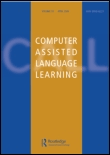
Computer Assisted Language Learning
Connecting Technology and Linguistics for Enhanced LearningComputer Assisted Language Learning is a prestigious journal dedicated to the interdisciplinary field of language education technology, published by Routledge Journals, Taylor & Francis Ltd. With its ISSN 0958-8221 and E-ISSN 1744-3210, the journal has become a cornerstone for researchers and practitioners interested in the innovative integration of computer technology in language learning processes. As of 2023, it holds an impressive impact factor, ranking Q1 in both Computer Science Applications and Linguistics and Language categories, indicating its significance within these scholarly domains. The journal covers a wide array of subjects, including language acquisition, educational technology, and instructional design, facilitating an understanding of how digital tools can enhance language learning experiences. Its rigorous editorial standards ensure that published articles undergo thorough peer review, making it a highly respected platform for disseminating cutting-edge research. With an extensive publication history dating back to 1990 and an ongoing commitment to exploring the dynamics of language learning in digital contexts, this journal is essential for academics, educators, and students alike who are looking to stay at the forefront of research in computer-assisted language education.
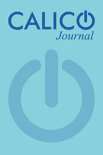
CALICO Journal
Advancing the Future of Language Education through Technology.CALICO Journal, published by EQUINOX PUBLISHING LTD, stands at the forefront of research in the intersection of technology and language education. With a prestigious history that spans from 1983 to 2024, this journal has been pivotal in advancing the field, earning high rankings in multiple categories, including Q1 in Education and Linguistics and Language, as well as Q2 in Computer Science Applications. Researchers and educators alike benefit from its wealth of articles that delve into innovative pedagogical strategies, the application of technology in language learning, and the exploration of linguistic theories. Although the journal is not currently open access, its impactful contributions are widely recognized, as evidenced by its strong Scopus rankings, placing it in the 88th percentile for Language and Linguistics. CALICO Journal remains an essential resource for those looking to enhance their practice and expand their knowledge in the dynamic fields of language learning and technology integration.

Language Learning in Higher Education
Advancing the frontiers of language education research.Language Learning in Higher Education is a prominent academic journal published by DE GRUYTER MOUTON, dedicated to exploring the intricate dynamics of language acquisition and pedagogical practices within the higher education context. With a robust ISSN: 2191-611X and E-ISSN: 2191-6128, this journal provides a platform for innovative research that addresses contemporary challenges and methodologies in language education. The journal enjoys a favorable reputation in the academic community, as evidenced by its ranks in the Scopus database, where it holds a position in the 67th percentile for Language and Linguistics and is classified in the Q3 and Q2 quartiles across relevant education and linguistics categories. Since its convergence in 2017, Language Learning in Higher Education aims to enrich scholarly discourse by publishing high-quality articles that foster insights into effective language learning strategies, thus serving as an essential resource for researchers, educators, and students committed to enhancing language education. The journal's editorial team is devoted to advancing the field through rigorous peer-review processes and welcomes contributions that push the boundaries of language learning research.
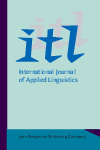
ITL-International Journal of Applied Linguistics
Connecting researchers and practitioners in the language education landscape.ITL-International Journal of Applied Linguistics, published by JOHN BENJAMINS PUBLISHING CO in Belgium, stands as a leading journal in the field of applied linguistics and education, recognized for its rigorous scholarship and impactful contributions. With an impressive ranking of Q1 in both the Education and Linguistics and Language categories, ITL holds its place among the top journals globally, featuring in the Scopus rankings with a notable 91st percentile in both Arts and Humanities as well as Social Sciences. The journal aims to disseminate innovative research exploring the intersection of linguistics, language acquisition, and pedagogical practices, fostering a rich academic dialogue among researchers, educators, and practitioners. Though not currently an open access journal, ITL remains accessible to a broad readership, with an emphasis on high-quality, peer-reviewed articles that inform and inspire advancements in applied linguistics. The journal's commitment to academic excellence and relevance makes it an essential resource for those seeking to understand and contribute to the dynamic landscape of language studies.